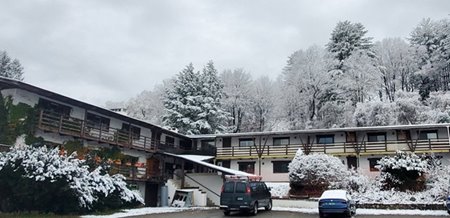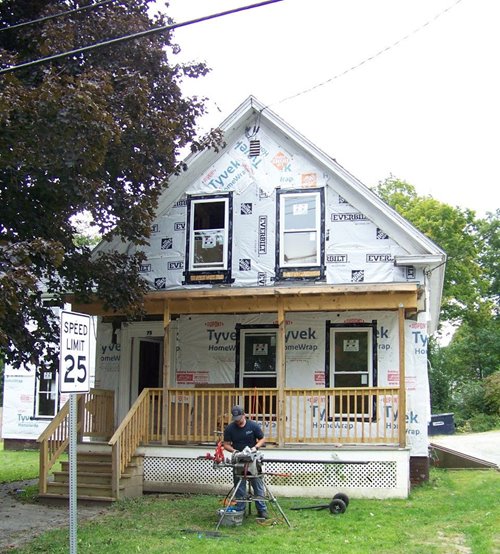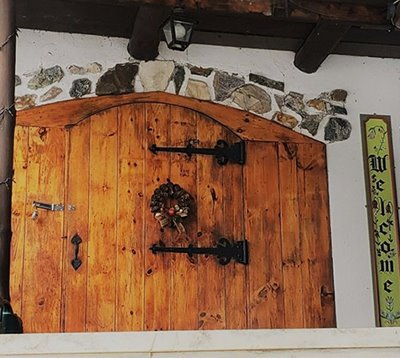When Windham & Windsor Housing Trust, a NeighborWorks organization in Brattleboro, Vermont, says "home for the holidays," they mean it quite literally. The organization has two projects, put together with funding from the Coronavirus, Aid, Relief and Economic Security (CARES) Act and a $59,000 grant from NeighborWorks America. Organizations must use CARES Act funding by the end of the year, which means that the new homes will be ready for the winter holidays.
That's a bright spot during December, when the country remembers those who died homeless by observing National Homeless Persons' Memorial Day on Dec. 21. Windham & Windsor is one of 61 NeighborWorks network organizations that provide services targeted for homeless individuals.
The housing includes a motel that the trust purchased. The units will become permanent supportive housing for people who have experienced chronic homelessness – one of the most vulnerable populations during COVID-19, says Marion Major, outreach and marketing coordinator. "All of these units are coming online right before Christmas," Major says.
 Known as Dalem's Chalet for 56 years, the property now includes 28 units being renovated with CARES funding and an additional seven units being renovated with funding from NeighborWorks America and state organizations. "NeighborWorks was the bridge," Major says. The residents at the former motel and spa will receive support services available to them around the clock, through a partnership with Groundworks Collaborative.
Known as Dalem's Chalet for 56 years, the property now includes 28 units being renovated with CARES funding and an additional seven units being renovated with funding from NeighborWorks America and state organizations. "NeighborWorks was the bridge," Major says. The residents at the former motel and spa will receive support services available to them around the clock, through a partnership with Groundworks Collaborative.
The other housing program is a Housing Recovery Program, a statewide program Vermont Housing Authority offers. The program offers up to $30,000 per unit for renovations, with a 10% match from owners. The idea is to bring vacant or blighted housing stock up to code and make it usable and livable. In exchange for the grants, the property owners must agree to rent the homes at a reduced rate for the next five years. Applicants applied for funding toward 67 units, Major says, and those properties too, will be ready by the end of the year.
Given the shortage of affordable housing – in Vermont and across the country – "this is massive," says Elizabeth Bridgewater, executive director of Windham & Windsor Housing Trust. In the past, "you can have a housing voucher but if there are no apartments to satisfy your voucher, you can't move anywhere."
Normally, Windham & Windsor develops 20 housing units a year. This year it's more than double that, Bridgewater says. "It's such a significant bump in our region. And it just happened in a few months."
The motel program is already leased up, Bridgewater says. For the Housing Recovery Program, individual property owners are responsible for the leasing.
"Vermont simply does not have enough homes to meet the needs of our community and because of this, our most vulnerable community members are the ones who are impacted the most," says Bridgewater. The CARES Act funding allowed them to use a number of strategies to impact the whole region.
In nearby Burlington, Champlain Housing Trust focuses on emergency shelters and affordable apartments to help homeless individuals. The pandemic prompted them to amplify services, adding 68 apartments for people coming out of homelessness.
"Up until the financial crash, we worked in partnership with homeless providers and service providers," says Brenda Torpy, CEO for the housing trust. "But after the housing crash, prices soared. There was a huge surge in homelessness." The state of Vermont put people up in hotels, but there was no outcome, no tracking, Torpy says. The organization, under the guidance of Michael Monte, who will become CEO when Torpy moves to a consultancy position in January, purchased its own motel and offered it to the state, along with services onsite. After 18 months, studies showed that they saved the state and an area hospital $1 million each. The motels, no longer in vogue for travel, became affordable stock that created nice, efficiency apartments. The trust bought more, partnering with the hospital for funding.
People coming out of homelessness have a range of needs, Torpy says. As the pandemic hit, the state put people in more motels as shelters needed to reduce their density. The bought another motel for partners Steps to End Domestic Violence, much needed in all times, but more urgently needed during the pandemic. They bought another motel to isolate people who have symptoms of COVID-19. And the 68-unit motel for people coming out of homelessness. "A lot of the activity came as a result of the pandemic," Torpy says.
 Having a safe, affordable, and healthy place to call home year around is critical to one’s health, and doubly important during COVID-19 when residents are being asked to shelter in place, says Romi Hall, director of healthy homes and communities for NeighborWorks. Organizations that help ensure residents experiencing homelessness are "home for the holidays," especially during a global pandemic, "demonstrates their commitment to their community and highlights the many ways we can tackle such a complex issue as homelessness. These kind of innovations are important to creating healthier communities throughout our nation."
Having a safe, affordable, and healthy place to call home year around is critical to one’s health, and doubly important during COVID-19 when residents are being asked to shelter in place, says Romi Hall, director of healthy homes and communities for NeighborWorks. Organizations that help ensure residents experiencing homelessness are "home for the holidays," especially during a global pandemic, "demonstrates their commitment to their community and highlights the many ways we can tackle such a complex issue as homelessness. These kind of innovations are important to creating healthier communities throughout our nation."
As the holidays approach, organizations are trying to find ways this year to provide a sense of community for those coming out of homelessness. With COVID-19, that's difficult, says Major. But the sense of community will come. Meanwhile, housing experts across the NeighborWorks network agree that the pandemic underscores the importance of having a place to call home.
Further reading: In rural areas, NeighborWorks network organizations work to fight homelessness where it is often invisible.
Learn more about the connection between health and having a home.
12/17/2020

